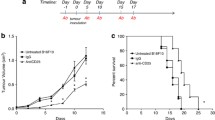Abstract
We utilized the gene gun to transfect subcutaneous D5 melanoma and MT-901 mammary carcinoma tumors in situ with a granulocyte/macrophage-colony-stimulating factor (GM-CSF) plasmid complexed to gold particles. There was diminished tumor growth following bombardment with GM-CSF plasmid, which was apparent only during the period of administration. Transgenic GM-CSF was produced by the skin overlying the tumors and not by the tumors themselves. GM-CSF plasmid bombardment resulted in increased cell yields within tumor-draining lymph nodes (TDLN) with at least a 12-fold increase in the percentage of dendritic cells (8.9%) compared to controls (0.7%). Secondarily activated TDLN cells from animals transfected with GM-CSF demonstrated enhanced cytokine release (interferon γ, GM-CSF and interleukin-10) in response to tumor stimulator cells compared to controls, and had an increased capacity to mediate tumor regression in adoptive immunotherapy. There was a small, but detectable, non-specific immune adjuvant effect observed with gold particle bombardment alone, which was less than with GM-CSF plasmid. The adjuvant effect of GM-CSF plasmid required peri-tumoral transgene expression since gene bombardment away from the tumor was ineffective.
Similar content being viewed by others
Author information
Authors and Affiliations
Additional information
Received: 27 April 1999 / Accepted: 27 August 1999
Rights and permissions
About this article
Cite this article
Tanigawa, K., Yu, H., Sun, R. et al. Gene gun application in the generation of effector T cells for adoptive immunotherapy. Cancer Immunol Immunother 48, 635–643 (2000). https://doi.org/10.1007/s002620050012
Issue Date:
DOI: https://doi.org/10.1007/s002620050012




